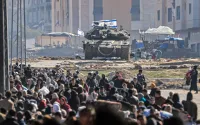8 October 2007Planet ArkNick Tattersall
From cotton producers in Mali to millet growers in Mauritania, those who work the land in some of the world's poorest nations spent much of the year praying for rain as clear skies and bright sunshine parched the earth.
But when the heavens opened, the downpours were some of the heaviest for a decade, sending floodwaters swirling through mud-hut villages, destroying homes and washing away crops from Senegal in the west to Ethiopia in the east.
"A heavy rain hit the village and lasted eight days. Several of our homes collapsed. Water came into our house then it took our crops from the fields," Assou, 18, said by telephone from near his village of Gouloko, in southwestern Benin.
The United Nations estimates 800,000 people in 13 countries across West Africa alone have been affected by flooding, with Ghana, Togo, Burkina Faso and Mali the hardest hit. Conservative estimates put the number killed across Africa at some 200.
In the worst affected areas, relief agencies have battled to provide emergency food rations, safe drinking water and mosquito nets. But even in places where the immediate risk is lower, the long term impact of crop failures will take a heavy toll on poor communities long after the waters have receded.
"The effects of floods combined with those of the severe drought which occurred in June/July have exacerbated the difficult living conditions of vulnerable families," UN humanitarian organisation OCHA said in its latest update.
"Market prices have doubled for most commodities. Lack of safe drinking water remains another major concern," it said of the situation in Ghana.
INCOME DESTROYED
Images of flooded villages in East and West Africa have been beamed around the world but, for many, the economic impact in the coming months is likely to prove devastating.
The destruction of food crops and the flooding of roads have meant what produce does make it to market is often selling at a premium beyond the reach of many, particularly those who rely on cash crops like cotton for their income.
Mali and Togo have both slashed their forecasts for cotton production in recent days, putting additional strain on a sector which employs an estimated 15 million people in West Africa and which is struggling against tumbling world prices and market-distorting subsidies paid to US farmers.
"The floods washed away our fields meaning we do not have anything to sell at market," said Henriette Kedji, another Gouloko villager. "The children were supposed to have started back at school but they are a worry for us because there is no money to send them to classes."
Plan, an international relief agency which works with children, has provided tents, mosquito nets, and sacks of rice to meet short-term needs in southwestern Benin but aid workers say such communities will need support in the longer term.
"Thousands of children have been affected by the disaster and it is certain that the food security situation and families' finances will be hard hit," said Michel Kanhonou, a children's rights co-ordinator for Plan in Benin.






